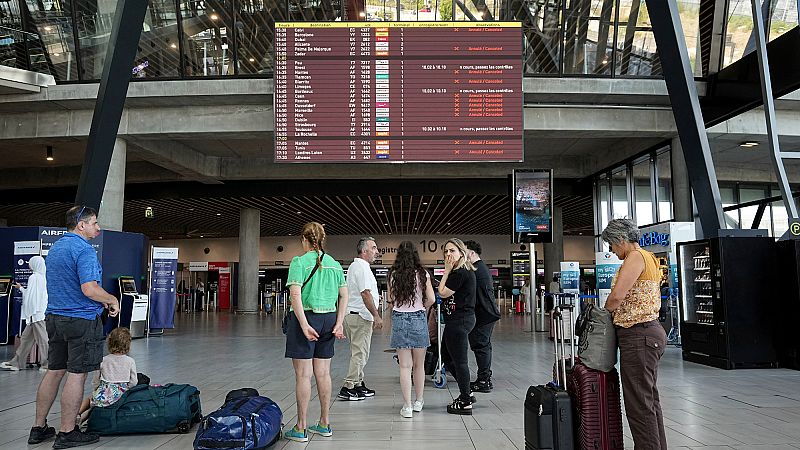
Whether you are going on holiday to relax, discover a new culture, visit friends or find yourself, having to deal with an unexpected emergency is unlikely to be on your dream itinerary.
Travelling in Europe, especially in the summer, is coming with increasing challenges as climate change throws weather curveballs at the continent and more regulations and tourist taxes are being brought in.
To avoid nasty surprises when you should be savouring a gelato or watching a sunset without a care in the world, here are things to watch out for and the ways you can be best prepared as a traveller.
Heatwaves and wildfires scorch Europe
There are several natural disaster risks around Europe that travellers should be aware of in summer.
Heatwaves have been scorching the continent since June, creating prime conditions for the outbreak of wildfires.
Over the weekend, Spain and Portugal entered a state of alert due to the worsening risk of blazes amid severe hot weather.
Temperatures hovered around 40 degrees Celsius or over in areas of the Iberian Peninsula on Sunday.
Greece and Türkiye have been battling wildfires throughout the summer, with thousands of residents forced to flee their homes and tourists evacuated.
Some areas of Italy, including the island of Sardinia, and France have also been affected.
Heatwaves themselves are also dangerous for travellers. They come with increased health risks, especially for older people or those with preexisting medical conditions.
Southern Europe sees rise in seismic activity
Popular holiday destinations around the Mediterranean, including Crete, Santorini, Naples, Sicily and Türkiye, have all been affected by earthquakes or volcanic eruptions this summer.
Although they haven’t caused serious damage or casualties, they are still alarming to experience as a visitor and could mean having to evacuate your accommodation midway through your trip.
There is growing concern amongst travellers about booking to visit tremor-prone destinations. In Santorini, one of Greece’s most visited destinations, local tourism officials estimate that arrivals could fall by as much as 25 per cent this year.
How travellers can prepare for natural disasters and weather extremes
A key precautionary measure when visiting extreme weather-prone destinations is staying informed of any local warnings.
Before your trip, research the specific area you're visiting and be aware of heat alerts, seismic risks, fire danger ratings and local emergency procedures.
Ensure that your mobile phone is registered to receive emergency alerts in the area where you are staying. You can do this by going into Settings, followed by Notifications, and Enabling Alerts.
Monitor local news, weather forecasts, and fire updates through official channels like emergency apps and websites.
If there is a heatwave warning during your trip, take precautionary measures like carrying extra drinking water or avoiding high-energy outdoor activities in the middle of the day. Follow local advice about what to do and what not to do during periods of prolonged high temperatures.

Older travellers and those with certain health conditions should be especially careful not to exert themselves.
If your itinerary involves outdoor adventure, it might be worth asking your travel provider if you can change your plans or dates if a heatwave is expected.
Ensure you have the right travel insurance for extreme weather coverage
When booking travel insurance, make sure you choose a policy that will refund you or entitle you to compensation should extreme weather or a natural disaster affect your holiday.
This is particularly important if you choose not to go ahead with your trip, even if the airline, tour operator or accommodation has not cancelled your bookings.
This is because, without an official ‘no-go’ warning from the government, travellers who choose not to go ahead with their trip are unlikely to receive reimbursement or compensation, as this is considered “disinclination to travel”.
The vast majority of travel insurance policies will also not cover situations of “loss of enjoyment” due to natural disasters or extreme weather, which includes being unable to leave your hotel.
Travellers can only expect refunds if their flights or accommodation are cancelled by airlines, providers or tour companies.
Some insurance policies include trip disruption or natural disaster cover, but not every company will offer this, so make sure you have the correct insurance before you leave.
New tourist taxes, entry fees and visitor caps
Dozens of destinations have brought in tourist taxes, entry fees to attractions, and visitor caps this year.
The hotspot Greek islands of Santorini and Mykonos both now charge a €20 cruise passenger levy during peak season, with Santorini maintaining a daily cruise visitor cap of 8,000.
The capital, Athens, has brought in a visitor cap to protect its most popular ancient site.
The Acropolis now only permits 20,000 visitors per day with mandatory timed entry tickets.
In Spain, Barcelona has increased its municipal tourist tax to €6.75 per night for guests staying in five-star hotels.
The surcharge is in addition to the standard nightly tourist tax (now €3.50) paid to the region, meaning a week-long stay in a five-star hotel will cost €47.25 on top of the room rate.
Ibiza has started limiting the number of tourist cars and caravans that can visit.
From 1 June to 30 September, the number of vehicles used by non-residents will be capped at 20,168, and you’ll need to get a permit if you do want to drive onto the island, which costs €1 per day.

In Italy, the archaeological site of Pompeii has introduced a daily visitor cap of 20,000. Visitors are recommended to purchase tickets in advance online to avoid long queues.
Italy’s capital city, Rome, has brought in a visitor cap for the Colosseum set at 3,000 at a single time.
Sardinia’s spectacular beaches are feeling the strain, and several now have visitor limits or booking requirements.
Crescent-shaped Tuerredda beach requires visitors to book via an app in advance and has been capping visitor numbers at 1,100 per day since 2020.
For the full list of beaches with restrictions, see here.
One levy you don’t need to worry about anymore this year is the Venice entry fee, which ended in July.
If you are flying into Türkiye, be aware that the Turkish Civil Aviation Authority (CAA) has imposed a new rule.
It requires passengers to remain seated with their seatbelts fastened until the aircraft reaches its designated parking spot and the fasten seatbelt sign is deactivated.
They must also wait for their row to be called to disembark the aircraft. Passengers violating the rules risk a $70 (€62) fine.
For other fees and taxes brought in before this year, see here.
Strikes and air traffic control struggles
Given the increase in passenger traffic in summer, strikes are more likely to take place as they are able to have a bigger impact.
For example, the General Union of Workers (UGT) has announced Spain-wide strikes at Azul Handling, part of the Ryanair group, from 15 August.
These will see a series of stoppages at all of its work centres and operational bases, including airports in Madrid, Barcelona, Seville, Malaga, Alicante, Ibiza, Palma de Mallorca, Girona, Tenerife South, Lanzarote and Santiago de Compostela.
They will take place every Wednesday, Friday, Saturday and Sunday until 31 December 2025.
Tens of millions of travellers are also expected to face delays this summer due to mass cancellations caused by air traffic control (ATC) strikes during peak travel periods.
The walkouts have already plunged flights into chaos in France, Spain and Italy.
What can travellers do to prepare for strikes?
There are several steps travellers can take to stay prepared and better informed about industrial action.
This includes checking government websites for official strike information as well as asking specific airlines and airports for the latest updates. Travellers are also advised to confirm the status of their flight before leaving for the airport.
If travel plans cannot be changed around strike dates, avoiding peak hours while heading to the airport and arriving with plenty of time to spare can help as well.
Having comprehensive travel insurance coverage is also advisable. If your flight is cancelled for any reason, the airline is obliged to offer you the choice between re-routing as soon as possible, re-routing at a later date, or a full refund within seven days.
However, the airline is not liable for any losses relating to accommodation, bookings or other knock-on effects of a delay or cancellation - only for the flight.
To make sure you are covered for additional losses, add travel disruption cover to your travel insurance policy in advance of your trip.







